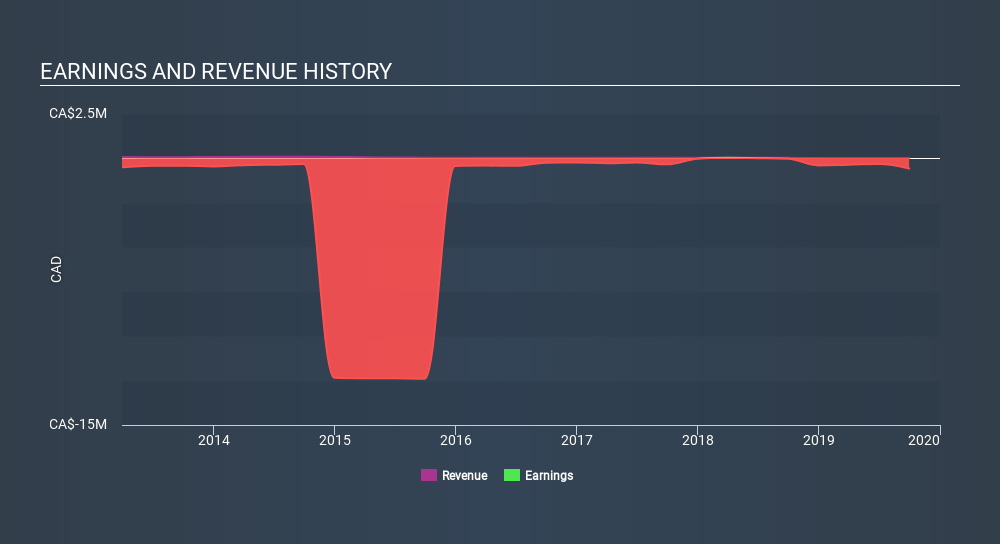
The big shareholder groups in Stroud Resources Ltd. (CVE:SDR) have power over the company. Institutions will often hold stock in bigger companies, and we expect to see insiders owning a noticeable percentage of the smaller ones. I generally like to see some degree of insider ownership, even if only a little. As Nassim Nicholas Taleb said, 'Don’t tell me what you think, tell me what you have in your portfolio.
Stroud Resources is a smaller company with a market capitalization of CA$6.3m, so it may still be flying under the radar of many institutional investors. In the chart below, we can see that institutional investors have not yet purchased shares. Let's delve deeper into each type of owner, to discover more about Stroud Resources.
See our latest analysis for Stroud Resources

What Does The Lack Of Institutional Ownership Tell Us About Stroud Resources?
We don't tend to see institutional investors holding stock of companies that are very risky, thinly traded, or very small. Though we do sometimes see large companies without institutions on the register, it's not particularly common.
There could be various reasons why no institutions own shares in a company. Typically, small, newly listed companies don't attract much attention from fund managers, because it would not be possible for large fund managers to build a meaningful position in the company. Alternatively, there might be something about the company that has kept institutional investors away. Institutional investors may not find the historic growth of the business impressive, or there might be other factors at play. You can see the past revenue performance of Stroud Resources, for yourself, below.

We note that hedge funds don't have a meaningful investment in Stroud Resources. Looking at our data, we can see that the largest shareholder is Eric Sprott with 11% of shares outstanding. Howard Atkinson is the second largest shareholder with 2.7% of common stock, followed by Mirsad Jakubovic, holding 2.4% of the stock. Mirsad Jakubovic also happens to hold the title of Member of the Board of Directors.
A deeper look at our ownership data shows that the top 4 shareholders collectively hold less than 50% of the register, suggesting a large group of small holders where no one share holder has a majority.
Researching institutional ownership is a good way to gauge and filter a stock's expected performance. The same can be achieved by studying analyst sentiments. As far I can tell there isn't analyst coverage of the company, so it is probably flying under the radar.
Insider Ownership Of Stroud Resources
The definition of company insiders can be subjective, and does vary between jurisdictions. Our data reflects individual insiders, capturing board members at the very least. Management ultimately answers to the board. However, it is not uncommon for managers to be executive board members, especially if they are a founder or the CEO.
Most consider insider ownership a positive because it can indicate the board is well aligned with other shareholders. However, on some occasions too much power is concentrated within this group.
Our most recent data indicates that insiders own a reasonable proportion of Stroud Resources Ltd.. It has a market capitalization of just CA$6.3m, and insiders have CA$1.0m worth of shares in their own names. I would say this shows alignment with shareholders, but it is worth noting that the company is still quite small; some insiders may have founded the business. You can click here to see if those insiders have been buying or selling.
General Public Ownership
The general public, who are mostly retail investors, collectively hold 84% of Stroud Resources shares. With this size of ownership, retail investors can collectively play a role in decisions that affect shareholder returns, such as dividend policies and the appointment of directors. They can also exercise the power to decline an acquisition or merger that may not improve profitability.
Next Steps:
It's always worth thinking about the different groups who own shares in a company. But to understand Stroud Resources better, we need to consider many other factors. Case in point: We've spotted 5 warning signs for Stroud Resources you should be aware of, and 2 of them are potentially serious.
Of course, you might find a fantastic investment by looking elsewhere. So take a peek at this free list of interesting companies.
NB: Figures in this article are calculated using data from the last twelve months, which refer to the 12-month period ending on the last date of the month the financial statement is dated. This may not be consistent with full year annual report figures.
If you spot an error that warrants correction, please contact the editor at editorial-team@simplywallst.com. This article by Simply Wall St is general in nature. It does not constitute a recommendation to buy or sell any stock, and does not take account of your objectives, or your financial situation. Simply Wall St has no position in the stocks mentioned.
We aim to bring you long-term focused research analysis driven by fundamental data. Note that our analysis may not factor in the latest price-sensitive company announcements or qualitative material. Thank you for reading.
About TSXV:SDR
Stroud Resources
A junior resource company, engages in the acquisition, exploration, and development of mineral properties in Mexico and Canada.
Moderate with weak fundamentals.
Market Insights
Community Narratives



